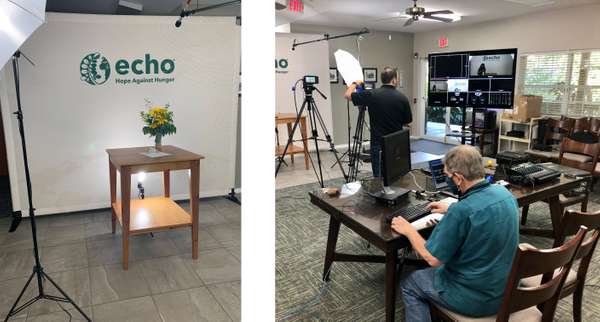
Figure 5. Studio set up at ECHO Florida for the 2020 virtual conference. Source: Stacy Swartz (left) and Tim Albright (right)
This year ECHO held its 27th Annual Conference--but with a twist. Like many events, meetings, and occasions this year, the ECHO conference took place online (Figure 5). This meant the loss of the excellent face-to-face networking that has always been a hallmark of past conferences; however, a major advantage was that hundreds of people from around the world, who would not have been able to travel to Fort Myers in normal years, were able to participate. While participants were unable to be on the ECHO farm for workshops, the online one-day event included multiple short videos (lightning talks) that highlighted techniques being demonstrated at ECHO.
Almost 700 people from 69 different countries registered on the WhovaTM app for the event. The conference featured four plenary speakers, 12 lightning talks and 15 breakout sessions. Most of these are now available to view on ECHOcommunity.org [http://edn.link/y3m7ym].
Plenaries -- The four plenary talks addressed farmer motivation (Neil Miller), extension services during crises (former ECHO intern, Dr. Kristin Davis), global health issues (Dr. Gen Meredith), and the role of agroforestry in reducing global hunger (Tony Rinaudo). Below are a few comments on two of these talks.
Dr. Davis explained some of the unique challenges facing extension providers during crises and times of disaster recovery. She presented examples of crises that undermined food security, including outbreaks of avian flu, Ebola, locusts and now COVID-19. Dr. Davis explained how extension services adapted to meet these challenges. Key insights learned from these experiences can help extension providers prepare for future events.
Extension providers can cautiously embrace technology for the way it allows them to share information and interact with farmers. In addition to providing individuals with technical skills, extension organizations should also provide training in critical thinking, communication, and emotional intelligence. They should empower staff to act when abnormal situations arise.
Organizations need to have flexible and collaborative structures built in. The Global Forum for Rural Advisory Services (GFRAS) has created a free online "New Extensionist Learning Kit" with self-directed modules to “clearly [articulate] the role of EAS [extension and advisory services] in the rapidly changing rural context.” It is available online at http://edn.link/9hf4ae.
Tony Rinaudo has contributed to ECHO conferences and publications for decades. (For example, see the ECHO Technical Note on Farmer Managed Natural Regeneration (FMNR) -- http://edn.link/tn-65.) It was inspiring to have him as a plenary speaker this year. Rinaudo first described the discovery of the “underground forest” many decades ago, then talked about the subsequent promotion and success of FMNR. In Niger, tree density increased from 4 trees/ha to 40 trees/ha in roughly 10 years, and around 5 million hectares of land were restored after about 20 years. Rinaudo then described more recent work in Uganda and Ethiopia, and stated that FMNR has been promoted in at least 25 countries.
In 2017, Rinaudo returned to Niger. He commented that “What had been a vicious cycle of degradation and poverty had become a virtuous cycle of restoration and relative prosperity.” [http://edn.link/j3y32c]
Lightning talks – The ECHO farm was visited virtually via the lightning talks, short videos that had been filmed and edited beforehand. One highlighted a recent demonstration of several planters specifically designed for Conservation Agriculture. ECHO Florida’s Appropriate Technology Manager, Elliott Toevs, with the aid of others, demonstrated the planters’ performance for planting cowpea, comparing the time, effort, and effectiveness of each one. Anyone practicing or interested in Conservation Agriculture will find this video [http://edn.link/je4rxh] helpful.
Breakout sessions-- Following Dr. Gen Meredith’s plenary talk on public health, a breakout session featured a question period with Andrea Paola Guzmán Abril, who serves with the Maya Health Alliance in Guatemala. Several topics were discussed:
- How to motivate families to eat a healthier diet
- How to introduce unfamiliar foods using traditional cooking methods. For example, Maya Health Alliance has conducted cooking classes on how to incorporate chaya into traditional foods such as tortillas, rice, pasta and pudding
- Resources for teaching people who cannot read
- Finding nutritional information for underutilized crops (hint:http://edn.link/6dtpch)
During this one-day conference, an amazing amount of information was shared, with excellent discussion from attendees around the world. It would take days to watch every presentation, but we believe many of you will find sessions that are relevant for your situation. The conference recordings are available on ECHOcommunity.org [http://edn.link/y3m7ym]. We hope you find them informative and inspiring.
Cite as:
Hargrave, B. 2021. 2020 ECHO International Agriculture Conference. ECHO Development Notes no. 150.